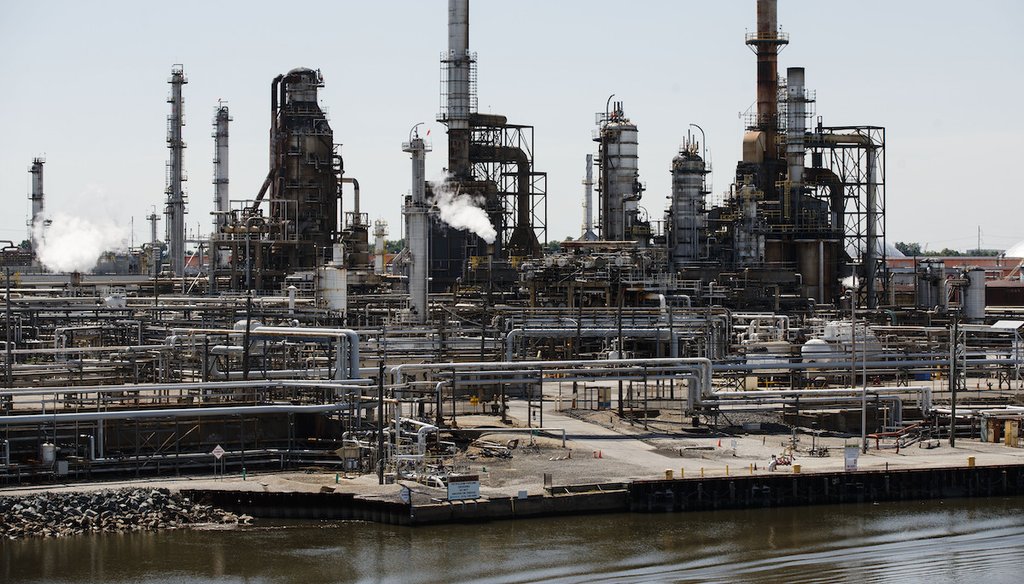Stand up for the facts!
Our only agenda is to publish the truth so you can be an informed participant in democracy.
We need your help.
I would like to contribute

The Philadelphia Energy Solutions refining complex in Philadelphia in 2019. (AP)
Mike Pence oversells U.S. ‘energy independence’ under Donald Trump
If Your Time is short
-
Under then-President Donald Trump, the U.S. became a net energy exporter and began producing more energy than it consumed. Both milestones hadn’t been achieved in decades.
-
However, this didn’t happen "in three short years," as Mike Pence claimed. The achievement built on more than a decade of improvements in shale oil and gas production, as well as renewables. The U.S. also did not achieve net exporter status for crude oil, which produces the type of energy that voters hold politicians most accountable for: gasoline.
-
The United States’ improved record on energy independence does not isolate the country from global developments. Because of how the international market for oil works, the U.S. still imports a substantial amount of oil for domestic use even when it is exporting more oil on net than it imports.
Former Vice President Mike Pence, one of the Republicans seeking the presidential nomination, blamed President Joe Biden for undoing energy policies instituted by former President Donald Trump, with whom Pence served.
On NBC’s "Meet the Press" on Aug. 13, Pence said, "In three short years, we achieved energy independence." Pence also said, "Joe Biden launched a war on energy on Day One. … (I) believe not only can we achieve American energy independence again, but I believe with the right policies going forward, we can reclaim our role as the leading producer of energy in the world."
Pence’s comments echoed statements he made Aug. 10, when he unveiled an energy plan, and Aug. 6 on CNN’s "State of the Union."
Did the Trump administration achieve energy independence? Did Biden’s administration squander it? And what does "energy independence" actually mean?
The Pence campaign did not respond to an inquiry for this article. But energy experts told PolitiFact that Pence’s statement is an oversimplification.
In recent years, the United States has provided for more of its own energy needs. Experts credit the growth in shale oil and shale gas production, increases in renewable energies such as solar and wind and improvements in efficiency.
This has led some politicians to describe the United States as having achieved "energy independence." But there is no single definition of what that means.
One measure is a country exporting more energy than it imports. By this standard, the U.S. did achieve energy independence under Trump, said Hugh Daigle, an associate professor of petroleum and geosystems engineering at the University of Texas at Austin.
The Energy Information Administration, a federal office that tracks energy statistics, found that in 2019 — when Trump was president and Pence was vice president — the United States became a net exporter of energy for the first time since 1952. "Energy" in this context includes all types, from heating oil to gasoline to sources used to generate electricity such as coal, natural gas and renewables.
And in 2020, the U.S. became a net exporter of petroleum for the first time since at least 1949.
Another way to measure energy independence is when domestic production exceeds domestic consumption.
In 2019 and 2020, when Trump was president, the U.S. made more energy than it consumed.
However, this didn’t end when Trump left office.
Energy production also outpaced consumption under Biden in 2021, and the U.S. has remained a net exporter of both energy overall and petroleum specifically under Biden. This undercuts Pence’s argument that Biden squandered energy independence.
Also, Pence’s framing of this development as occurring in "three short years" underplays more than a decade of progress toward the goal. U.S. energy production has risen consistently for more than a decade, under presidents of both parties.
"Energy independence" includes all forms of energy. However, the data for crude oil — which is used to manufacture gasoline, which for many consumers is most important — did not follow the same pattern as energy overall.
Featured Fact-check
For crude oil, imports outpaced exports in each of the four years Trump was president, as well as in Biden’s first two years in office. (Crude oil and petroleum are different; the U.S. is a net exporter of petroleum, a finished product, but a net importer of crude oil, a raw product used to make petroleum and petroleum products.)
There’s a reason for the imbalance in crude oil imports and exports.
Although the U.S. theoretically produces enough crude oil to satisfy its consumption, the U.S. is unable to refine all of the crude oil it produces, experts say.
Crude is graded by its weight and its "sweetness," which is a measure of the oil’s sulfur content. Most U.S.-produced oil is "light" and "sweet," and although some U.S. refineries are able to process it, many cannot.
Instead, these refineries are built to process heavier, less sweet crude (also called heavy, sour crude) from the Middle East and other overseas suppliers. That’s a holdover from past decades, when the U.S. was primarily importing its crude.
This mismatch keeps the U.S. from simply using its own crude production to serve domestic needs. Changing the mix of refineries to accommodate U.S.-produced crude oil would be expensive and would take years to complete.
This means the U.S. is exporting a lot of its domestically produced crude on the international market. This also means the U.S. is still importing a substantial amount of oil for domestic use.
As a result, the "energy independence" touted by Pence glosses over the reality that the U.S. still imports a lot of crude oil.
"Gasoline refineries ship much of their product overseas, while we rely on imported gasoline to satisfy domestic demand," Daigle said. "As long as we are still relying on imports to satisfy domestic demand for oil, gas, and especially refined products, I would argue that we have not really achieved energy independence."
For instance, Daigle said, much of New England relies on foreign imports of oil and natural gas because the region lacks pipeline capacity and because of laws that regulate domestic shipping.
Although presidents have long chased energy independence, none have achieved it, said Frank A. Verrastro, senior vice president of energy, national security and foreign policy for the Center for Strategic and International Studies, a Washington, D.C.-based think tank.
"Even as we export certain refined products and light oil, we continue to need heavier oil and certain products due to our domestic refinery configuration and consumer demand, weather-related incidents like hurricanes and more recently heat waves, and transport logistics," he said.
This means that even in a period of greater energy independence for the U.S., its supply is still sensitive to international events, said Mark Finley, a fellow in energy and global oil at Rice University’s Center for Energy Studies. Even in April 2020 — a period that Pence’s statement suggests was defined by U.S. energy independence — Trump was in high-stakes negotiations with Russian President Vladimir Putin and Saudi Crown Prince Mohammed bin Salman over oil production.
"While the U.S. produces more energy than it consumes, it remains closely connected to — and dependent on — global developments," Finley said.
Pence said, "In three short years, we achieved energy independence."
Although there are various interpretations of "energy independence," Pence has a point that on Trump’s watch, the U.S. became a net energy exporter and began producing more energy than it consumed and exporting more than it imports. Both were achievements the U.S. hadn’t seen in decades.
However, this didn’t happen "in three short years" — it built on more than a decade of improvements in shale oil and gas production, as well as renewables. The U.S. also did not achieve net exporter status for crude oil, which produces the most closely watched type of energy for many consumers: gasoline.
Finally, the United States’ improved record on energy independence does not isolate the country from global developments. Because many U.S. refineries are unable to process the type of crude oil produced in the U.S., they need to import a different type of oil from overseas to serve the domestic market
We rate Pence’s claim Half True.
Our Sources
Mike Pence, interview on CNN’s "State of the Union," Aug. 6, 2023
Mike Pence, "Meet the Press," Aug. 13, 2023
Energy Information Administration, U.S. energy facts explained, accessed Aug. 10, 2023
Energy Information Administration, Oil and petroleum products explained, accessed Aug. 10, 2023
Energy Information Administration, Monthly Energy Review, July 2023, accessed Aug. 10, 2023
Energy Information Administration, U.S. crude oil imports. accessed Aug. 13, 2023
Energy Information Administration, U.S.crude oil exports, accessed Aug. 13, 2023
Houston Public Media, U.S. is not "energy independent," despite Trump’s claims, Jan. 13, 2020
The Wall Street Journal, Trump, Putin, Saudi Crown prince scramble to fix oil markets, April 10, 2020
NBC News, Biden vowed 'consequences' for Saudi Arabia after oil production cut. But the U.S. has no plans to follow through, Dec. 9, 2020
CNN Politics, Pence rolls out energy plan with goal to make US top energy producer by 2040, Aug. 8, 2023
Factcheck.org, Examining U.S. ‘energy independence’ claims, March 9, 2022
Nasdaq, America Produces Enough oil to meet Its needs, so why do we import crude?, March 8, 2022
Reuters, Fact check: Which factors determine U.S. ‘energy independence’?, March 23, 2022
USA Facts,, Is the U.S. energy independent?, Oct. 31, 2022
CNN, Fact check: Despite claims of Trump-era ‘energy independence,’ the US never stopped importing foreign oil, March 15, 2022
PolitiFact, Former Missouri governor missed the mark with Keystone XL statement, March 19, 2021
PolitiFact, Hillary Clinton claim that US is energy independent goes too far, Oct. 11, 2016
PolitiFact, Trump promise tracker, July 15, 2020
Email interview, Frank Verrastro, Frank A. Verrastro, senior vice president of energy, national security and foreign policy for the Center for Strategic and International Studies
Email interview, Hugh Daigle, Hugh Daigle, associate professor of petroleum and geosystems engineering at the University of Texas at Austin, Aug. 9, 2023
Email interview, Mark Finley, fellow, energy and global oil at Rice University’s Center for Energy Studies, Aug. 9 2023
Browse the Truth-O-Meter
More by Matthew Crowley
Mike Pence oversells U.S. ‘energy independence’ under Donald Trump
Support independent fact-checking.
Become a member!
In a world of wild talk and fake news, help us stand up for the facts.



















































